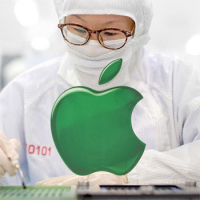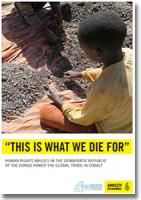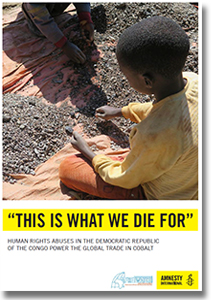“This Is What We Die For”
This report is the first comprehensive account of how cobalt enters the supply chain of many of the world’s leading brands.
This report documents the hazardous conditions in which artisanal miners, including thousands of children, mine cobalt in the Democratic Republic of the Congo.
It goes on to trace how this cobalt is used to power mobile phones, laptop computers, and other portable electronic devices.
Using basic hand tools, miners dig out rocks from tunnels deep underground, and accidents are common.
Despite the potentially fatal health effects of prolonged exposure to cobalt, adult and child miners work without even the most basic protective equipment.
People around the world increasingly rely on rechargeable batteries to power their mobile phones, tablets, laptop computers and other portable electronic devices.
The growing global market for portable electronic devices and rechargeable batteries is driving the growing demand for the extraction of cobalt, a key component in lithium-ion rechargeable batteries.
More than half of the world’s total supply of cobalt comes from the Democratic Republic of the Congo (DRC). According to the government’s own estimates, 20% of the cobalt currently exported from the DRC comes from artisanal miners in the southern part of the country.
There are approximately 110,000 to 150,000 artisanal miners in this region, who work alongside much larger industrial operations.
These artisanal miners, referred to as creuseurs in the DRC, mine by hand using the most basic tools to dig out rocks from tunnels deep underground. Artisanal miners include children as young as seven who scavenge for rocks containing cobalt in the discarded by-products of industrial mines, and who wash and sort the ore before it is sold.
This report, jointly researched by Amnesty International and African Resources Watch (Afrewatch), examines the conditions under which artisanal miners extract a significant proportion of the world’s cobalt supply, and then traces how this mineral is traded.
It is the first comprehensive account of how cobalt from the DRC’s artisanal mines enters the supply chain of multinational companies, including some of the world’s wealthiest electronics companies.
The report assesses the extent to which companies have put in place human rights due diligence measures to know where the cobalt in their products comes from and the conditions under which it is extracted and traded.
What’s Related


Favorites





